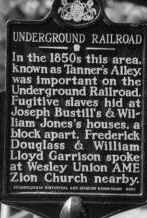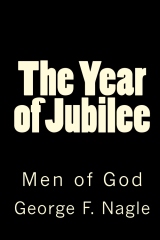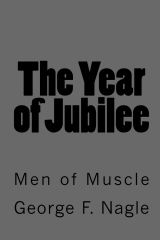

Study Areas:
Underground Railroad
Underground
Railroad Chronology
Learn More
1845 and 1848: Abby Kelley Foster Lectures in Harrisburg
1845, April 2-3 A delegation of American Antislavery Society speakers, including Abby Kelley (later Abby Kelly Foster) and Jane Elizabeth Hitchcock, speak at the Courthouse in Harrisburg. A Philadelphia correspondent reports that they lectured to large audiences, "many of whom were ladies." Unfortunately the lectures were marred by pro-slavery activists who "raised false alarms of fire," heckled the speakers, and showered the group with eggs. The women were also threatened with tar and feathers, and duckings. ("Mobocracy in Harrisburg," Carlisle Herald & Expositor, 9 April 1845; "Mobocratic Interruptions," The Liberator, 25 April 1845)
1848, March Female abolitionist Abby Kelley Foster lectures in Harrisburg. This is her second appearance in Harrisburg (see 1845, April). Foster, a forceful and dynamic speaker, convinced many women that they could have an active, vocal role in social change. The Philadelphia U.S. Gazette belittled Foster's Harrisburg appearance by noting "We wonder if she knows how to broil a steak or knit stockings."
By the late 1840's, Harrisburg was attracting regular speakers in support of abolitionist doctrine. For more than ten years the town had supported a small but active Anti-Slavery Society, and the Pennsylvania Anti-Slavery Society, with high profile members Robert Purvis, Lucretia Mott and Miller McKim had been organized here. While the leaders of Harrisburg's African American community and a few white abolitionists, such as the Rutherford and Graydon families and Church of God minister John Winebrenner supported these speakers, most of the local citizenry was apathetic or even outright hostile to these events.
An 1845 visit from four abolitionist speakers, including the dynamic Abby Kelly, received an unkind welcome from a large crowd of Harrisburg rowdies. As reported in the Carlisle Herald:
Mobocracy in Harrisburg
Miss Abby Kelly, the well known Abolition lecturer, accompanied by a party of her friends, has been holding a series of meetings in Harrisburg. On Wednesday and Thursday evenings last, while she was lecturing in the Court House, a disgraceful assault was made upon the party by some disorderly persons, who commenced throwing eggs, and in various ways disturbed the meeting. Proceedings of this kind are disgraceful to the capital of the State, and most dishonorable to the character of those engaged in them.
In 1847 Frederick Douglass and William Lloyd Garrison spoke at the courthouse, but a rowdy crowd outside of the building disrupted the event by throwing firecrackers, rotten eggs, and bricks. Abolitionist Abby Kelley Foster faced an even larger challenge, not only because of the strong societal taboo against female speakers, but also because she advocated equal rights for African Americans and women, a view many abolitionists were not yet ready to embrace.
The North Star, Frederick Douglass' newspaper, supported Foster and her equal rights views, and defended her right as a woman to speak out and to become politically and socially involved. When the Philadelphia newspaper U.S. Gazette made the following scathing mention of Foster's activity, The North Star reprinted it:
"Abby Kelley has been lecturing in Harrisburgh on abolition. We wonder if she knows how to broil a steak or knit stockings." In reply, The North Star said
We have ever noticed that when a female gives evidence of a superior mental cultivation--that she had lived to some purpose, above and beyond the everyday animal routine of menial duties--that she aspired to drink of the fountain of knowledge--to take the place in the scale of intellectual being, which it was designed by her Creator that she should till, she is met with sneers like the above from the "lords of creation."...When we hear of the eloquence, the learning, the statesmanship, of a distinguished man, who ever thinks of asking, Can he hold a plough? Can he saw wood? Can he drive a team? Can he plant potatoes, or hoe corn? Oh no! it is assumed to be the natural position of man to triumph in the conflict of mind; to him is assigned an exclusive monopoly of the deep treasures of learning; eloquence is his birthright, and fame his just reward. But whenever one of the other sex ventures beyond the sphere assigned for the mass--whenever she displays natural talents highly cultivated, and the gifts which God has bestowed upon her improved, enlarged, elevated--it is received as something what ought to be frowned upon--as an assumption of prerogatives belonging not to her. But this feeling is wearing away with the progress of society--with a juster appreciation of woman's duties, and their influence upon all the relations of life."
While many abolitionists looked only to the end of slavery, Foster, Douglass, and others were looking beyond that issue. They saw how the rights of African Americans and the rights of women were not inseparable, and that the question was not really about the legitimacy of slavery, but about whether basic human rights were applicable to all.
Sources
Carlisle
Herald and Expositor, 9 April 1845
North
Star (Rochester,
NY), 17 March 1848.
Learn More
For more on Abby Kelley Foster, see http://www.cr.nps.gov/nr/travel/pwwmh/ma42.htm
Now Available
The Year of Jubilee
Vol. 1: Men of God and Vol. 2: Men of Muscle
by George Nagle
 Both
volumes of the Afrolumens book are now on Amazon and in local
bookstores
Both
volumes of the Afrolumens book are now on Amazon and in local
bookstores
The Year of Jubilee is the story of Harrisburg'g free African American community, from the era of colonialism and slavery to hard-won freedom.
Volume One, Men of God, covers the turbulent beginnings of this community, from Hercules and the first slaves, the growth of slavery in central Pennsylvania, the Harrisburg area slave plantations, early runaway slaves, to the birth of a free black community. Men of God is a detailed history of Harrisburg's first black entrepreneurs, the early black churches, the first black neighborhoods, and the maturing of the social institutions that supported this vibrant community.
It includes an extensive examination of state and federal laws governing slave ownership and the recovery of runaway slaves, the growth of the colonization movement, anti-colonization efforts, anti-slavery, abolitionism and radical abolitionism. It concludes with the complex relationship between Harrisburg's black and white abolitionists, and details the efforts and activities of each group as they worked separately at first, then learned to cooperate in fighting against slavery. More here
Non-fiction, history. 607 pages, softcover.
 Volume
Two, Men of Muscle takes the story from 1850 and the Fugitive Slave
Law of 1850, through the explosive 1850s to the coming of Civil War
to central Pennsylvania. In this volume, Harrisburg's African American
community weathers kidnappings, raids, riots, plots, murders, intimidation,
and the coming of war. Caught between hostile Union soldiers and deadly
Confederate soldiers, they ultimately had to choose between fleeing
or fighting. This is the story of that choice.
Volume
Two, Men of Muscle takes the story from 1850 and the Fugitive Slave
Law of 1850, through the explosive 1850s to the coming of Civil War
to central Pennsylvania. In this volume, Harrisburg's African American
community weathers kidnappings, raids, riots, plots, murders, intimidation,
and the coming of war. Caught between hostile Union soldiers and deadly
Confederate soldiers, they ultimately had to choose between fleeing
or fighting. This is the story of that choice.
Non-fiction, history. 630 pages, softcover.
Volume
One and Two Available now at Amazon, and at:
Civil War and More Books
Midtown Scholar Bookstore
